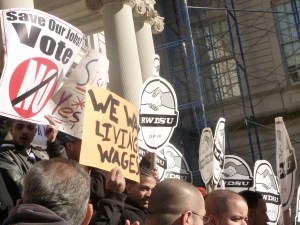 Facing an increasing pressure from unions and elected officials on issues relating to living wage, the Bloomberg administration is planning to commission its own report and task force on wage policy issues.
Facing an increasing pressure from unions and elected officials on issues relating to living wage, the Bloomberg administration is planning to commission its own report and task force on wage policy issues.
In recent days, the city’s Economic Development Corporation has begun reaching out to various organizations that would sit on the task force, including Good Jobs New York, the building service workers’ union SEIU 32BJ, the Center for an Urban Future and the Partnership for New York City.
The administration expects to issue a request for proposals next month, seeking a private consultant to help create a policy report examining living/prevailing wages and the economic effects such policies might have on the city, according to a person familiar with the effort.
The effort seems to be a response to the unions and other groups, which have been pressing for higher mandated wages throughout the city, although particularly on developments that involve city subsidies or land-use approvals. Most recently, the Bloomberg administration suffered a humiliating defeat when its plans for a mall at the Kingsbridge Armory in the Bronx were defeated after a group of local elected officials demanded that all retail tenants pay at least $10 an hour ($11.50 without benefits), a new precedent in the city. The Bloomberg administration and the private developer building the mall refused, leading to the project’s defeat at the hands of the City Council.
But the City Council is considered more liberal than it was just last year—a new progressive caucus was just formed this week—so the Bloomberg administration could also be seeking to grasp control of the issue itself before it is brought to the mayor’s desk on the Council’s terms. (For instance, there is a 32BJ-endorsed bill in the Council that currently has a majority of members signed on as co-sponsors, requiring that buildings getting certain city subsidies and incentives pay a prevailing wage to building service workers.) The Bloomberg administration is clearly reticent to add such requirements on developers, and particularly retailers, although it has agreed to living-wage provisions on specific developments in the past.
While there is substantial data and research on the living-wage issue nationally, there does not seem to be all that much catered to New York, and thus one could see a benefit from a thorough study.
“I think we have to start dealing with these issues outside of a project-by-project basis,” said Kathryn Wylde, president of the Partnership for New York City. “As a city we really have to think through these issues and make decisions based on factual evidence.”



